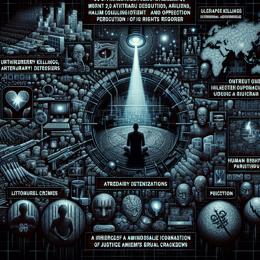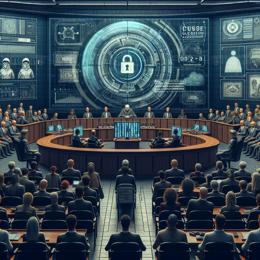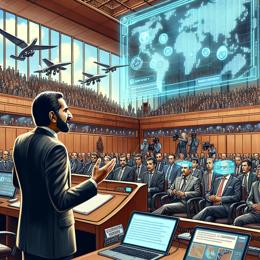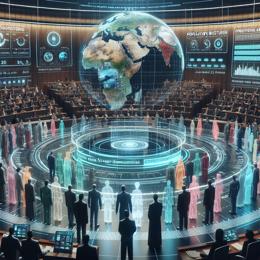Image created by AI
South Africa Accuses Israel of Apartheid at UN International Court of Justice
In a compelling legal engagement at the United Nations' premier judiciary body, the International Court of Justice (ICJ), South Africa has explicitly accused Israel of enforcing apartheid against the Palestinian people. This palpable declaration unfolds amidst broader discussions regarding the legitimacy of Israel’s longstanding occupation of territories earmarked for the eventual formation of a Palestinian state.
During a procedural convocation that falls on the second day of a series of hearings, South Africa unabashedly addressed the 15-judge panel. These hearings are predicated on a request by the UN General Assembly for an advisory opinion that tackles the legal standing of Israel’s activities within the occupied territories. South Africa, through its ambassador to the Netherlands, Vusimuzi Madonsela, underscored its ethical imperative to call out and terminate apartheid practices wherever they might manifest.
This comes against a grim backdrop of unyielding conflict, with recent reports from Gaza’s Health Ministry citing over 29,000 Palestinian casualties. This humanitarian crisis lends a poignant urgency to the deliberations at hand. Notably, Israel opted against making oral submissions at these hearings, a position consistent with its historical dismissal of UN and international judicial institutions due to perceived biases. However, a written submission presented last year sought to elucidate Israel’s concerns about security, while highlighting obligations to its citizenry and advocating for bilateral negotiations in addressing the disputed West Bank.
Israel has remained firm, categorizing the area as "disputed territory," opposing the widespread view of international illegality that blankets its settlements spread across the West Bank—where Jewish settlers now count over half a million in comparison to about three million Palestinians. Israel's annexation of east Jerusalem exacerbates these contentions, with the international community yet to recognize its claim over the entirety of the city, famed for its religious significance.
The heightened tension cascades from a broader geopolitical history—dating back to the Six-Day War of 1967 when Israel seized control over the Gaza Strip, East Jerusalem, and the West Bank. The Palestinian Authority has long sought these regions as the groundwork for envisaging a sovereign nation. Nonetheless, Israeli settlements proliferate, intensifying hindrances to Palestinian self-determination and further entrenching the occupation which South Africa's Pieter Andreas Stemmet decried as effectively permanent.
These thematic arguments resonated with preceding submissions by Palestinian representatives—further solidifying six days of hearings that are expected to span months before yielding an advisory opinion. With 51 nations and several international bodies poised to deliver statements, the potency of these deliberations is undeniable.
The key thrust of the Palestinian argument centers on the enduring military occupation by Israel, which is seen as a breach of key international principles such as the ban on territorial conquest, the right to self-determination, and the barring of racial segregation and apartheid. Palestinian Foreign Minister Riad Malki amplified these views further in calling for a definitive declaration of the cessation of the Israeli occupation.
South Africa, too, draws upon its historic struggle against apartheid to reinforce its stance favoring Palestinian calls for sovereignty. Synergies are drawn between its own nefarious history of racial segregation and the conditions allegedly prevalent in Gaza and the West Bank. These historical parallels compel South Africa to not only voice concerns but also institute a separate legal proceeding against Israel for purported acts of genocide during its offensive strategies following attacks by Hamas. Israel has reiterated its stance, strongly articulating its defensive posture in a conflict it neither commenced nor desired.
This intensification of legal scrutiny foretells a protracted journey towards any final adjudication by the International Court of Justice. Nevertheless, until such time as a definitive ruling emerges, South Africa firmly anchors its legal and moral politics on the side of Palestinian struggles against occupation, continuing a legacy of opposition to systemic oppression in all its manifestations.
#GOOGLE_AD










